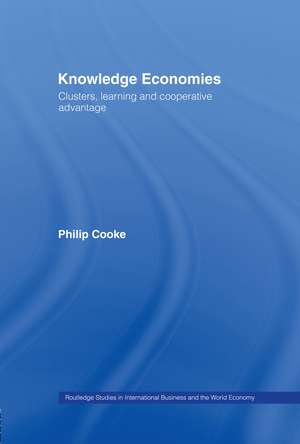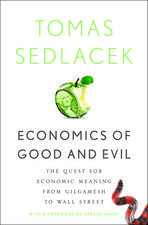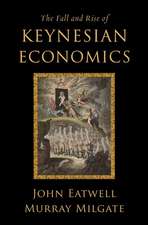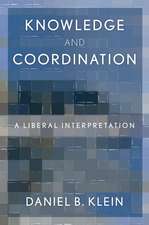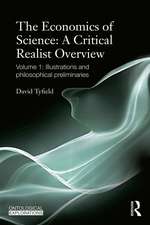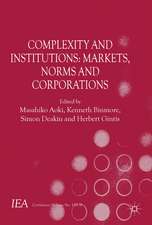Knowledge Economies: Clusters, Learning and Cooperative Advantage: Routledge Studies in International Business and the World Economy
Autor Philip Cookeen Limba Engleză Hardback – 11 oct 2001
Din seria Routledge Studies in International Business and the World Economy
-
 Preț: 311.91 lei
Preț: 311.91 lei - 18%
 Preț: 1059.84 lei
Preț: 1059.84 lei -
 Preț: 488.71 lei
Preț: 488.71 lei -
 Preț: 419.92 lei
Preț: 419.92 lei -
 Preț: 419.92 lei
Preț: 419.92 lei -
 Preț: 485.32 lei
Preț: 485.32 lei - 18%
 Preț: 699.21 lei
Preț: 699.21 lei - 28%
 Preț: 823.57 lei
Preț: 823.57 lei -
 Preț: 486.98 lei
Preț: 486.98 lei -
 Preț: 399.41 lei
Preț: 399.41 lei -
 Preț: 390.57 lei
Preț: 390.57 lei -
 Preț: 420.76 lei
Preț: 420.76 lei - 26%
 Preț: 765.77 lei
Preț: 765.77 lei - 28%
 Preț: 821.94 lei
Preț: 821.94 lei - 26%
 Preț: 850.59 lei
Preț: 850.59 lei -
 Preț: 469.38 lei
Preț: 469.38 lei - 18%
 Preț: 1109.36 lei
Preț: 1109.36 lei - 18%
 Preț: 1119.13 lei
Preț: 1119.13 lei - 28%
 Preț: 819.90 lei
Preț: 819.90 lei - 25%
 Preț: 992.79 lei
Preț: 992.79 lei - 18%
 Preț: 1113.95 lei
Preț: 1113.95 lei - 18%
 Preț: 703.16 lei
Preț: 703.16 lei -
 Preț: 415.24 lei
Preț: 415.24 lei - 18%
 Preț: 1108.42 lei
Preț: 1108.42 lei - 18%
 Preț: 1804.25 lei
Preț: 1804.25 lei -
 Preț: 488.33 lei
Preț: 488.33 lei -
 Preț: 424.58 lei
Preț: 424.58 lei -
 Preț: 419.70 lei
Preț: 419.70 lei - 28%
 Preț: 851.46 lei
Preț: 851.46 lei - 15%
 Preț: 555.16 lei
Preț: 555.16 lei -
 Preț: 466.29 lei
Preț: 466.29 lei -
 Preț: 473.20 lei
Preț: 473.20 lei - 15%
 Preț: 702.39 lei
Preț: 702.39 lei - 18%
 Preț: 1162.56 lei
Preț: 1162.56 lei -
 Preț: 272.60 lei
Preț: 272.60 lei - 26%
 Preț: 820.71 lei
Preț: 820.71 lei - 25%
 Preț: 498.58 lei
Preț: 498.58 lei - 28%
 Preț: 851.99 lei
Preț: 851.99 lei - 18%
 Preț: 1802.68 lei
Preț: 1802.68 lei
Preț: 1793.04 lei
Preț vechi: 2186.64 lei
-18% Nou
Puncte Express: 2690
Preț estimativ în valută:
343.21€ • 372.92$ • 288.48£
343.21€ • 372.92$ • 288.48£
Carte tipărită la comandă
Livrare economică 21 aprilie-05 mai
Preluare comenzi: 021 569.72.76
Specificații
ISBN-13: 9780415164092
ISBN-10: 0415164095
Pagini: 232
Ilustrații: 9 tables
Dimensiuni: 156 x 234 x 19 mm
Greutate: 0.54 kg
Ediția:New.
Editura: Taylor & Francis
Colecția Routledge
Seria Routledge Studies in International Business and the World Economy
Locul publicării:Oxford, United Kingdom
ISBN-10: 0415164095
Pagini: 232
Ilustrații: 9 tables
Dimensiuni: 156 x 234 x 19 mm
Greutate: 0.54 kg
Ediția:New.
Editura: Taylor & Francis
Colecția Routledge
Seria Routledge Studies in International Business and the World Economy
Locul publicării:Oxford, United Kingdom
Public țintă
PostgraduateCuprins
1. Clusters, Collective Learning and Disruptive Economic Change
2. An Evolutionary Approach to Learning, Clusters and Economic Development: Theoretical Issues
3. Multi-Level Governance and the Emergence of Regional Innovation Network Policy
4. Learning, Trust and Social Capital
5. Networks and Clusters in the Learning Economy
6. The Clustering Phenomenon in the 'New Economy': an Anatomy of Growth and Further Lessons for Policy
7. Can Clusters be Built? Questions for Policy
8. Knowledge Economies: Here to Stay? Where to go?
2. An Evolutionary Approach to Learning, Clusters and Economic Development: Theoretical Issues
3. Multi-Level Governance and the Emergence of Regional Innovation Network Policy
4. Learning, Trust and Social Capital
5. Networks and Clusters in the Learning Economy
6. The Clustering Phenomenon in the 'New Economy': an Anatomy of Growth and Further Lessons for Policy
7. Can Clusters be Built? Questions for Policy
8. Knowledge Economies: Here to Stay? Where to go?
Notă biografică
Phillip Cooke, Cardiff University, UK
Descriere
This book traces the theoretical explanation for clusters back to the work of classical economists and their more modern disciples who saw economic development as a process involving serious imbalances in the exploitation of resources.
